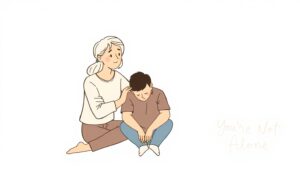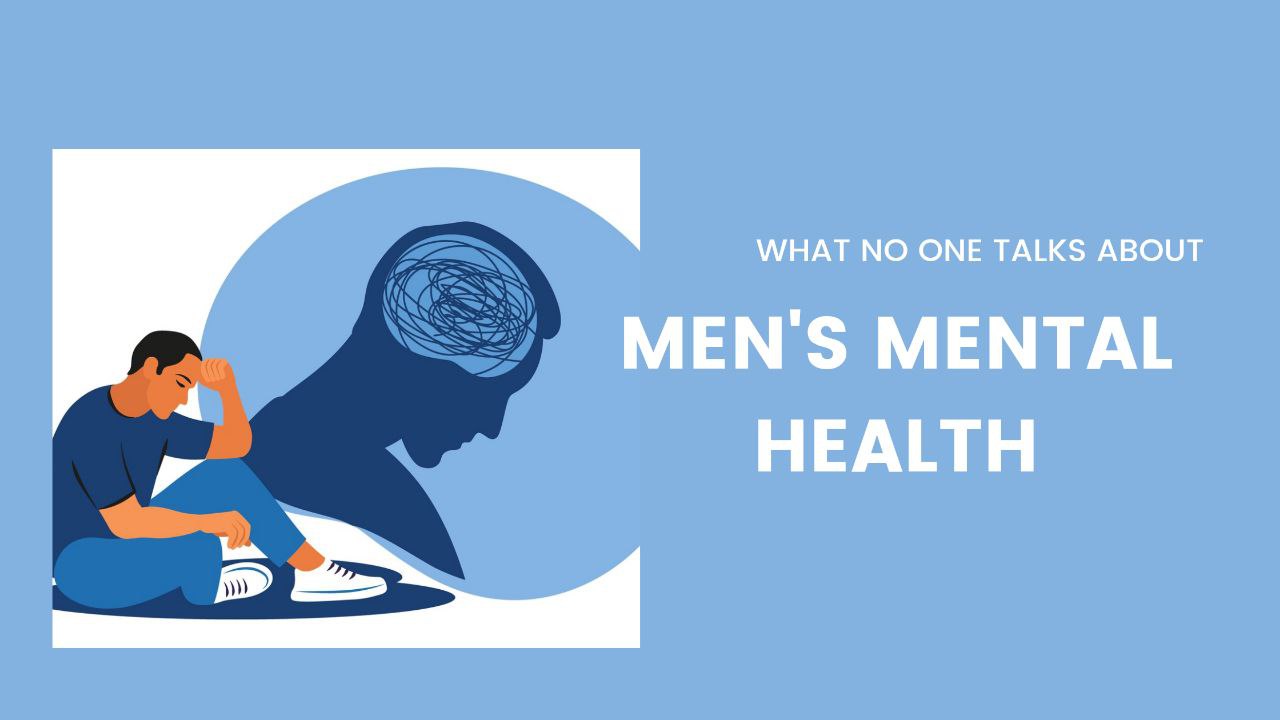Uncover the secret battles of men’s mental health, why they get ignored, and how we can build a better support system. Find the signs, solutions, and support systems that actually work.
Introduction: Breaking the Silence

When a person imagines strength, the world likes to portray that a man is strong, independent, and unemotional. But behind such a picture, most men are suffering in silence. Men‘s mental health is not receiving the focus it needs. The truth is, men also have emotional problems like anyone else, but feel that they must hold their emotions in.
Globally, men are less likely to seek assistance for mental illness but more likely to take their own lives. The paradox suggests men are in a crisis, but they’re not crying out for help. This blog aims to:
- Open the conversation on men‘s mental health
- Highlight the most common issues
- Provide practical and realistic solutions
- Offer accessible resources that truly assist
When you complete this entry, you will be able to comprehend men‘s psychological problems, how you can recognize the signs, and what you can do to help yourself or someone else.
Why Men‘s Mental Health Gets Overlooked
Social Expectations
Men are socialized early on to “man up,” “don‘t cry,” and “be tough.” These messages encourage emotional denial and discourage men from being honest about their vulnerabilities. Phrases like “boys don’t cry” continue to play out in most cultures. This socialization trains men to suppress their feelings, and over time, stress and emotional pain build up.
Stigma of Mental Illness
Mental illness is often mistakenly considered a sign of weakness, especially in men. To admit depression, nervousness, or emotional distress is to risk a breach in a man’s code. Men will be ashamed of their feelings and fear being seen as being less competent or being held in lower regard if they share them.
Lack of Awareness and Representation
Most of the mental health campaigns and talks are addressed to women and children. There are no representations of men’s issues, and it‘s harder for them to spot or look for help. There are also no male mental health models in the media who talk about their mental health freely.
Fear of Judgment
Men fear being perceived as weak, non-productive, or incompetent by their employers, families, and friends and thus internalize their problems. They might feel that their problems are “not bad enough” to seek treatment or that they should be able to “get it together” independently.
Common Mental Health Disorders among Men
Depression in Men:
Rather than appearing to be sad, depressed men will appear irritable, angry, numb, or extremely tired. They will either work longer or cut themselves off from society. The majority of men are unaware that they are depressed because the symptoms are varied.
Anxiety and Stress
Men can experience overwhelming stress concerning money, job performance, or family responsibilities. This typically manifests as restlessness, racing mind, or panic attacks. Unfortunately, out of pride or pressure, most of them remain in high-stress contexts without addressing their mental health.
Substance Abuse
Predominantly men turn to cigarettes, alcohol, or drugs as a coping strategy to numb emotional pain, even aggravating the underlying problem. Substance use can become a way of “escape” from problems instead of confronting them.
Suicidal Ideation and Self-Injury
Statistically, suicide is more likely to kill men. It is a tragic reality because it is caused by internalized pain, isolation, and not being able to articulate emotional distress. Since men do not exhibit any external symptoms, it is more difficult to recognize when a man reaches his breaking point.
Burnout and Overwork
The provider burden can force men to work themselves to death, resulting in physical and emotional exhaustion. This “silent sacrifice” culture forces most men to suppress their needs until it is too late.
Symptoms of Mental Health Problems in Men
The discovery of signs of mental distress is the start of recovery. Among the most critical symptoms to observe are as follows:
- Reduced interest in hobbies or activities of everyday living
- Sudden shifts in mood or angry outbursts
- Sleep disturbances (oversleeping or insomnia)
- Abnormalities in appetite (loss of appetite or overeating)
- Fatigue and lack of motivation
- Withdrawal or alienation from the loved ones
- Reporting feelings of despair or self-doubt
Pay attention to these red flags in yourself and others. Early intervention can make a big difference.
Healthy Coping Strategies
Instead of stifling emotions or falling back on unhealthy behaviors, men can acquire healthier coping skills:
Talk to Someone
Talking to a close friend, relative, or counselor can alleviate emotional load and put things into perspective. Men find verbalization therapeutic and it makes them feel heard and understood.
Physical Activity
Exercise boosts endorphins and is statistically shown to lower depression and anxiety. Walking or sporting activity each day has the potential to improve mood and sleep.
Practice Mindfulness
Breathing exercises, meditation, or journaling can calm the mind and create emotional clarity. Guided meditations for men are also available on apps like Headspace or Calm.
Avoid Drugs and Limit Alcohol
These medications have the potential to exacerbate mood disorders and create dependency. If quitting becomes difficult for you, get assistance. Healthier alternatives like herbal tea, smoothies, or taking a walk are much better coping strategies.
Have Healthy Sleep Habits
Aim for 7-9 hours of sleep. Regular sleeping habits are the foundation of emotional well-being and clear thought. Avoid screens in the hour leading up to bedtime and create a calming sleeping environment.
Supporting Men‘s Mental Health as a Friend or Family Member

If someone you know might be in need, this is how you can assist them:
Listen Without Judgment
Provide a safe, non-judgmental environment where they can speak freely without fear of judgment. Sometimes, having someone to listen to you can lighten a heavy burden.
Avoid “Tough Love”
Saying things like “get over it” or “man up” are hurtful. Empathy and patience are powerful tools. Validate their feelings without trying to solve everything at once.
Check In Often
Sending multiple texts or calls to ask about how they are can make an individual feel valued and less alone. Ask an open-ended question and hear the answer.
Encourage Expert Support
Encourage them to seek therapy or counseling services and be prepared to walk them through it. Make mental health check-ups as routine as taking physical check-ups.
When and How to Seek Professional Help

Asking for assistance isn‘t a weakness—it‘s an indication of strength towards healing. Seek professional assistance when:
- Symptoms last longer than two weeks
- Emotional distress interferes with daily functioning
- You‘re struggling with suicidal ideation
- You’re using substances to cope regularly
- You‘re weighed down with responsibility or emotional pain
Types of Professional Support:
Therapists: Offer talk therapy, CBT, or EMDR to manage thoughts and behavior
Psychiatrists: They can prescribe and treat disorders with medication
Support Groups: Provide a comfortable space to connect with others who understand your path
Online Therapy: Convenient and accessible for those uncomfortable with in-person sessions
Shifting the Discourse of Masculinity
We all need to do our part to construct a healthier, more supportive environment for men.
Redefine Strength
True strength lies in knowing oneself, being vulnerable, and having the guts to seek help. Healthy men are strong men.
Educate and Speak Up
Take advantage of your platform—your workplace, dinner table discussions, or social media—to create awareness. Share stories, articles, or videos that break the stigma.
Oppose Toxic Masculinity
Let us move away from old-fashioned notions that discourage men from being emotional. We must encourage boys and men to convey the entire range of emotions.
Promote Mental Health at Work
Challenge your organization to provide mental health programs and make mental health sick days the norm. HR practices must promote well-being, not productivity.
Conclusion:
Men‘s mental health matters. It‘s not weakness—it‘s being human, whole, and honest. By promoting open talk, supporting each other, and removing stigma, we can create a world in which men can feel safe to talk and heal. All human beings should have peace of mind, compassion, and care—regardless of gender. It is time to break the silence and build a world where men can openly say, “I‘m not okay.”.







